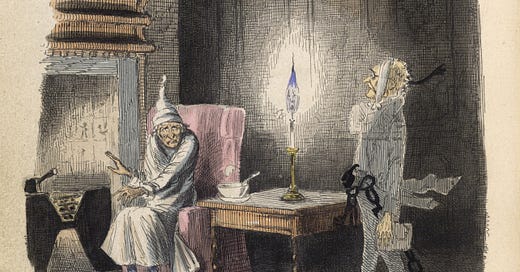A Ghost Story of Christmas
Long before A Christmas Carol, another festive haunting chilled England's baubles
In November 1843, Charles Dickens published a slim novella that was fully titled A Christmas Carol; In Prose; A Ghost Story of Christmas. It sold for five shillings and was praised as “wonderful,” “playful and sparkling,” and “one of the smartest little books for a Christmas present that we have ever seen.” Almost everyone today knows the story of Ebenezer Scrooge and the ghosts of Christmas past, present, and future (even if that knowledge comes from the version told by the Muppets).
But Dickens’ popular tale was not the first Christmas ghost story. There is a much earlier story, and this one is purported to be true. We find it in an edition of Jackson’s Oxford Journal from 1762 — more than 80 years before Dickens wrote his famous story (and 230 years before the Muppets updated it).
The story concerns a man named Taylor, who lived with his daughter in a house in Aylesbury, Buckinghamshire. It was over a period of several nights during Christmas 1761 that Taylor and his daughter were terrified by strange noises at the doors of their house. The noises were described as “the Knocking and Scratching of a Ghost”.
One night, Taylor met with an unnamed gentleman and described the troublesome affair. The gentleman advised Taylor to draw circles on both sides of the doors at which the knocking and scratching had been heard. Taylor followed the gentleman’s advice — and it worked. Taylor was, the Oxford Journal reported, “now ready to verify upon Oath that the Ghost has since entirely abandoned the House.”
“Great pity it is that this Gentleman’s Advice had not been had in Relation to the COCK-LANE GHOST,” added the newspaper. This referred to a then-famous haunting, which was being reported in the press at the time. The inhabitants of a lodging house in Cock Lane, near London’s Smithfield Market, were bothered by strange sounds attributed to a ghost known as “Scratching Fanny.” Fanny Lynes was the former partner of Cock Lane lodger William Kent and had died from smallpox. But the ghost claimed she had been poisoned with arsenic by Kent.
The affair became a huge public sensation. However, it was eventually determined that the haunting had been a hoax perpetrated by another of the lodgers, Elizabeth Parsons, under duress from her father Richard, who was tried and sentenced to be pilloried (placed in stocks for public humiliation) and serve two years in prison. Coincidentally, among those who took great interest in the Cock-Lane Ghost was Charles Dickens. He mentioned it in three of his books. (But not in A Christmas Carol. In Nicholas Nickleby, Mrs Nickleby says her great-grandfather “went to school with the Cock-Lane Ghost.”)
As for the unnamed gentleman who helped to exorcise the Aylesbury ghost, the Oxford Journal said he was willing to help others and “in like cases will give Advice gratis.”⬧
It’s been several months since the last edition of Singular Discoveries. I stopped for a while because I was busy and because, let’s be honest, the newsletter just wasn’t generating enough interest. Since I stopped publishing, more readers signed up — welcome! But I still have to work out how to do this going forward, and I have some reservations about the Substack platform. I’ve no plans to monetise this newsletter. The aim is to build an audience away from social media. So you can expect to receive these emails less regularly, when I have the time to write and something to say, and when I feel there’s enough interest to read it. Think of it as an occasional update, perhaps. If you have any thoughts about the newsletter and its future direction do let me know. And if you haven’t already, please do sign up — and encourage like-minded friends to join us.
I’m pleased to say my story about the wannabe American Gangsters who botched a disastrous bank robbery in Newcastle upon Tyne made Narratively and Pocket’s top five most-shared list for 2021. You can read the story (and listen to it) here.


I didn’t publish a whole lot of words in 2021, but I did write a whole lot, some of which will hopefully appear in a book / film / podcast very soon. Some highlights: As well as the above-mentioned The Gangsters Who Robbed the Wrong Bank at Narratively, I published The Female Horse Thief over at Medium Longium. On a sport / true crime theme, I wrote about The Undercover Cricketers for Wisden's The Nightwatchman and about The Man Who Stole the FA Cup for FourFourTwo.
My book The Ruhleben Football Association: How Steve Bloomer's Footballers Survived a First World War Prison Camp was published in 2020 but got lost during the Great Unpleasantness, so I relaunched it in 2021 so it could get lost again in the Ongoing Great Unpleasantness. Here’s a Twitter thread about how the prisoners celebrated four Christmases in Ruhleben:


Finally, here’s a Twitter thread of some of my favourite longform articles by other writers that weren’t included in the excellent Sunday Long Read Best of 2021 list:


As always, all of my stuff is available on my website: stuffbypaulbrown.com
Back relatively soon. Have a Merry Christmas / Happy Festivus, and don’t have nightmares.
Oh, and if you enjoyed this post please click this magic button:
Main sources: Jackson’s Oxford Journal, 27 March 1762; London Morning Chronicle, 20 November 1842.





